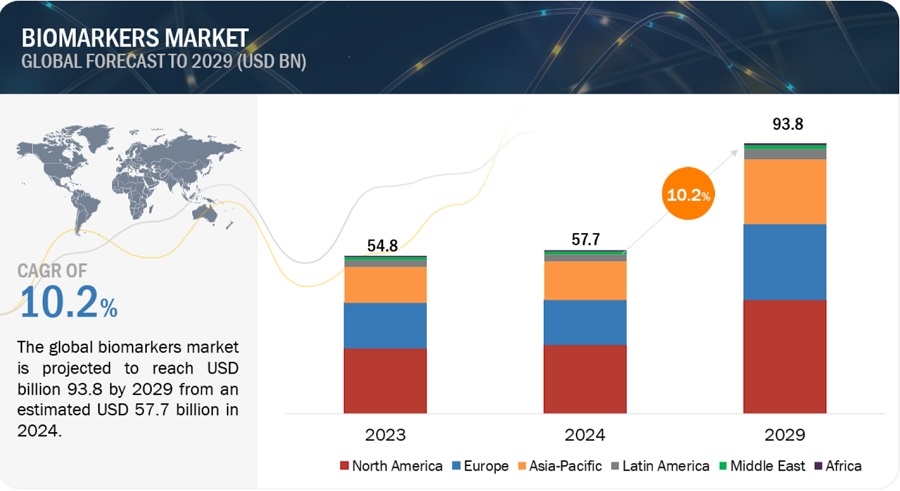The biomarkers market, with an estimated worth of $57.7 billion in 2024, is expected to increase to $93.8 billion by 2029, growing at a CAGR of 10.2%. The study provides a detailed analysis of industry trends, pricing structures, patent evaluations, insights from conferences, stakeholder identification, and market purchasing dynamics.
DRIVER: Increase in global prevalence of cancer
Biomarkers play a crucial role in indicating various health or disease characteristics. Cancer, being a complex disease, undergoes a multistage carcinogenesis process involving numerous molecular pathway events, posing challenges in diagnosis, prognosis, and therapy. Given this complexity, relying on a single marker is insufficient. Furthermore, each cancer type exhibits unique molecular profiles. The discovery of novel biomarkers presents opportunities to develop therapeutic strategies aimed at addressing dysregulation in cancer. Consequently, the rising incidence of cancer will fuel biomarker research and subsequently contribute to the expansion of the biomarkers market.
RESTRAINT: Disease complexity and heterogeneity
The complexity and heterogeneity inherent in diseases pose challenges to the advancement of biomarkers. With diverse molecular pathways and clinical presentations among individuals, identifying universal biomarkers becomes a daunting task. Disease heterogeneity complicates this further, as different patients exhibit distinct molecular signatures, making it challenging to find common biomarkers applicable across populations. Additionally, disease progression is dynamic, requiring biomarkers to adapt to changing conditions over time. These complexities hinder translating biomarker research into clinical practice, where biomarkers must accurately reflect the diverse disease manifestations for effective diagnosis, prognosis, and treatment monitoring. Thus, addressing the intricacies of disease complexity and heterogeneity is crucial for the successful development and implementation of biomarkers in healthcare settings.
OPPORTUNITY: Shift towards personalized medicine and precision oncology
Biomarkers play an essential role in the selection of targeted therapies that specifically address the molecular characteristics of a patient's tumor. For example, specific genetic mutations or alterations in cancer cells can make them susceptible to inhibition by targeted drugs. Biomarker testing helps identify these molecular aberrations, enabling oncologists to choose the most effective treatment for each patient.
Biomarker-driven approaches help identify patients who are most likely to benefit from a particular treatment, reducing the risk of exposing individuals to therapies that are unlikely to be effective or may cause significant side effects. This personalized approach enhances patient safety and quality of life during cancer treatment.
CHALLENGE: Challenges associated with integration of complex data sets
The integration of complex data sets in biomarker research poses significant challenges to market growth. Biomarker data, sourced from diverse platforms such as traditional blood tests, next-generation sequencing (NGS), and fluorescence in situ hybridization (FISH) testing, is voluminous, diverse, and rapidly evolving. The absence of universal standards for reporting, particularly in NGS-derived data, complicates data interpretation and aggregation across different organizations and testing methodologies. Moreover, disparities in biomarker testing across racial, ethnic, and economic groups further hinder data accessibility and completeness. Limited coverage by health plans and disparities in clinical trial enrollment exacerbate these challenges, leading to inaccessible, incomplete, or poorly representative biomarker datasets.
The consumables segment accounted for the largest share by product & service segment in the biomarkers market in 2023.
By product & service, the biomarkers market is categorized into consumables, services, and software. The consumables are further sub-segmented into assay kits, reagents & chemicals, columns & filters. The consumables accounted for the largest share of the global biomarkers market in 2023. The large share of consumables is due to the necessity for high-quality products to ensure accurate test results, coupled with the repetitive need for these consumables due to ongoing sample testing in research and clinical settings.
The safety biomarkers segment accounted for the largest share by type segment in the biomarker market in 2023.
By type, the biomarkers market is categorized into safety biomarkers, efficacy biomarkers, and validation biomarkers. The efficacy biomarkers are subsegmented into predictive biomarkers, surrogate biomarkers, pharmacodynamics biomarkers, and prognostic biomarkers. The safety biomarkers segment is expected to grow at the highest CAGR during the forecast period. This can be attributed to their importance in ensuring the safety of pharmaceuticals and healthcare interventions. Safety biomarkers are specifically designed to assess the potential adverse effects, toxicity levels, and safety profiles of drugs and treatments during clinical trials and post-marketing surveillance.
The NGS segment is expected to grow at a higher rate during the forecast period.
Based on technology, the biomarkers market has been segmented into immunoassays, NGS, PCR, mass spectrometry, chromatography, and other technologies. The immunoassay technology is subsegmented into ELISA, western blot, and protein microarray. In 2023, the immunoassays segment accounted for the largest share of the biomarkers market, and the NGS segment is expected to grow at a higher growth rate during the forecast period of 2024-2029. The immunoassay segment’s growth is driven by its extensive use in clinical settings for diagnosing diseases, monitoring treatment effectiveness, and predicting patient outcomes.
The cancer segment accounted for the largest share of the disease indication segment in the biomarkers market in 2023.
Based on the disease indication, the biomarkers market is segmented into cancer, infectious diseases, immunological disorders, neurological disorders, cardiovascular disorders, and other disease indications. In 2023, cancer accounted for the largest share of the biomarkers market. The expansion of the cancer biomarkers market is fueled by a surge in research funding dedicated to the rising personalized drug products for cancer treatment.
The North America region accounted for the largest share of the biomarkers market in 2023.
The biomarkers market is segmented into North America, Europe, Asia Pacific (APAC), Latin America (LATAM), the Middle East, and Africa. The North America region is witnessing increasing investments and research activities in the field of drug discovery. The need for advanced therapies due to the increased prevalence rate of cancer has contributed to the growth of the biomarkers market.
Content Source:
https://www.marketsandmarkets.com/PressReleases/biomarker.asp



